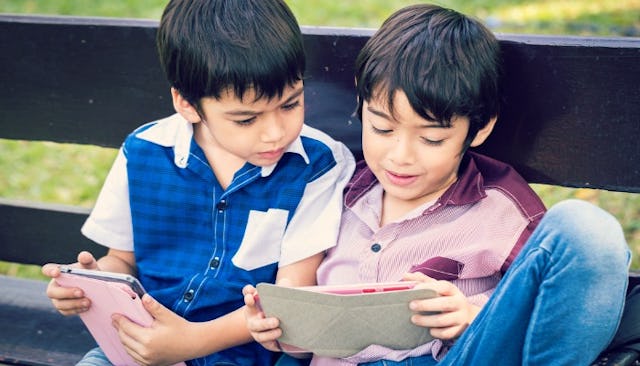How The Internet Keeps Our Kids Safe And Happy

There is a lot of discussion about the dangers of allowing our children too much access to technology. I read articles every day urging me to give my children a 1970s childhood, warning me to unplug them before it’s too late, and relating hundreds of horror stories about stalkers and predators posing as teenagers online. Yet, even with all the potential pitfalls of our new Internet-dependent culture, I still believe that technology has given my children a better life than I had.
It’s true that the prevalence of technology means that children these days have to deal with the inescapable possibility of cyber-bullying. When I was young, I was safe at home, protected from tormentors by thick doors and the loving embrace of my family. Today, children are constantly connected to the outside world. Cellular signals and Internet connections transcend the boundaries we put up against our peers, following us into what used to be our sanctuary.
There have been bullies since the first classroom opened its doors to students. Confining groups of prepubescent and teenage kids together for six hours a day is like pressurizing oxygen: One little spark, and it’s primed to explode. However, bullies act like lions preying on the weak and injured gazelles in a herd; there are only a few of them, and they can only hunt by isolating a single animal from its pack. Otherwise, they are not strong enough, fast enough, or clever enough to overpower their more maneuverable prey.
When I was a kid, it wasn’t hard to separate the less popular children from the group. It was usually pretty obvious who were the outsiders: the ones who wore the wrong shoes, listened to the wrong music, or looked different from the other kids. Just because hurtful words weren’t transported to their rooms via screens didn’t mean the hurt didn’t follow them home. Pain has a way of breaking down doors while love struggles to scale walls. They still suffered, alone in their rooms, stinging from wounds inflicted the old-fashioned way.
Technology doesn’t oppress children, but it can make them citizens of the world. Through the invention of Skype, I’ve seen my children play with their cousins and listen to stories told by their grandparents even though they live 5,000 miles away. My son has watched children from all over the world play with their toys on YouTube. He has seen them laugh at the same things he finds funny, enjoy the same toys, and experience the same frustrations as he does even though they look different and often speak a different language. He is not confined by the stigma and beliefs of the place he was born. At 5 years old, he already knows more about the universal human condition than so many adults.
Even activities which used to be solitary have become social. I frequently hear parents complain about how much time their children spend playing video games instead of going out and socializing with their friends. Except, they are socializing. Intricate webs of social hierarchies exist within the frameworks of these games, just like any high school, but in the world of a video game, kids are judged on their abilities rather than what they look like. They get to choose what they put out into their virtual world and, as a result, form friendships with a much wider variety of people than they would otherwise.
Knowledge and experience are power, and technology has given our children the world at their sticky fingertips. No matter what they love, they have the power to reach out to others with the same interests, ask questions from experts, join communities, and even interact with their favorite celebrities on Twitter. Children who used to feel like anomalies in a homogeneous world are now armed with the knowledge that they are not alone, and the resulting boost in confidence is sometimes enough to keep the predators at bay.
Parents fight to protect their children from harm, sometimes at the expense of allowing them important and enriching experiences in life. There are social perils and potential dangers in any social interactions. When I was a teenager, my parents worried about kidnappers and date-rape drugs. Now, parents worry about Internet stalkers and child pornography rings. When I was a kid, bullies called you names and then shoved you into a locker. Now, they post naked photos of you on the Internet and let millions of strangers call you names instead. People have always had the capacity for cruelty, but at least our children have the ability to reach out for help and support that wouldn’t have been available 20 years ago.
Someday, my children will have to face peer pressure, teasing and gossiping from their friends and classmates, but it will not be because of technology. If anything, the connections they’ve made and nurtured by the grace of the Internet will help remind them that hateful people are just a few out of the billions of people out there. Thanks to technology, they will have the entire collection of human history to guide them, the entire population from which to find their soulmates, and every piece of art or music ever created to inspire them. Their lives are privileged in ways I couldn’t have imagined.
This article was originally published on